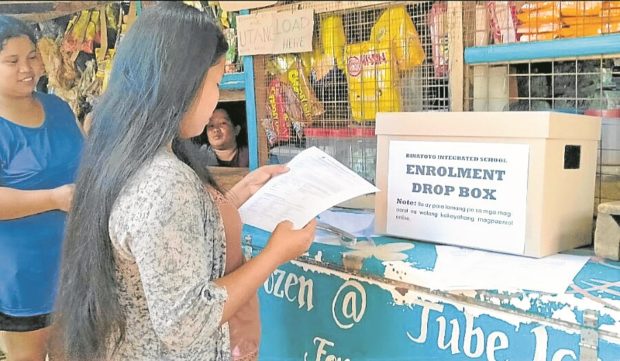
DROP HERE The Department of Education (DepEd) in Laguna province set up drop boxes in areas where parents can enroll their children for schools opening in August. —DEPED PHOTO
SAN PABLO CITY, Laguna, Philippines — Schools shifting to distance learning prompted by the coronavius pandemic gave hope to reviving an old government project meant to digitize basic education in Laguna province 10 years ago.
With face-to-face teaching indefinitely deferred, Laguna’s local officials revisit the Rizal tablets project, named after national hero Dr. Jose P. Rizal, especially so to help children and teachers transition to stay-at-home learning.
For one, Pakil Mayor Vincent Soriano said he was “seriously looking” at distributing the Rizal tablets this school year for students in his town, a fifth-class municipality (annual income: P5 million-P10 million).
“There are just a lot to consider, especially the cost,” he said.
The tablet project was launched in 2011 in time for Rizal’s 150th birth anniversary.
The provincial government and the Department of Education (DepEd) purchased and distributed about 50 tablets each to at least 18 public high schools that contained applications about Rizal’s life and works and other lessons in mathematics and science.
The government spent about P500,000 for the devices and teachers’ training, but the project failed after a couple of years, with teachers complaining of not enough classroom use or preferring traditional teaching modes.
Learning kiosks
Former Laguna board member Neil Nocon, who conceptualized the project, said the pandemic forcing a shift to blended learning opened an opportunity to “revisit” the program.
“The idea is that it becomes a tool to enhance learning, with [Dr. Jose P.] Rizal being the ‘poster boy’ of education,” Nocon said on Wednesday.
Wilfredo Cabral, DepEd director for Calabarzon (Cavite, Laguna, Batangas, Rizal and Quezon), said local governments could tap their special education funds to provide for students’ gadgets.
Cabral said 1.9 million out of 3.7 million expected enrollees in the region had already enlisted for the incoming school year, which would start in August.
The DepEd has also opened “learning kiosks” by placing drop boxes in barangay halls, churches, schools and public markets, where parents, in areas still under quarantine, may submit their children’s enrollment forms.
These kiosks would serve as drop-off areas where the parents could pick up learning modules and lesson handouts once school opened, Cabral said.
“But so far, based on our computation, it shows that [schools or local governments] will save more by [distributing] digital gadgets rather than spending for the logistics and the printing of pages and pages of [learning] modules,” he said.